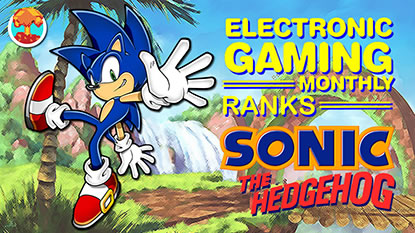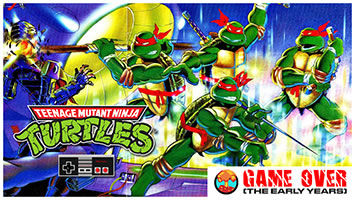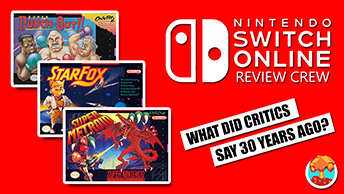- CLASSIC MAGAZINES
- REVIEW CREW
A show recapping what critics thought back
when classic games first came out! - NEXT GENERATION'S BEST & WORST
From the worst 1-star reviews to the best
5-stars can offer, this is Next Generation! - NINTENDO POWER (ARCHIVE)
Experience a variety of shows looking at the
often baffling history of Nintendo Power! - MAGAZINE RETROSPECTIVE
We're looking at the absolutely true history of
some of the most iconic game magazines ever! - SUPER PLAY'S TOP 600
The longest and most ambitious Super NES
countdown on the internet! - THEY SAID WHAT?
Debunking predictions and gossip found
in classic video game magazines! - NEXT GENERATION UNCOVERED
Cyril is back in this spin-off series, featuring the
cover critic review the art of Next Generation! - HARDCORE GAMER MAGAZING (PDF ISSUES)
Download all 36 issues of Hardcore Gamer
Magazine and relive the fun in PDF form!
- REVIEW CREW
- ELECTRONIC GAMING MONTHLY
- ELECTRONIC GAMING MONTHLY RANKS
From Mario to Sonic to Street Fighter, EGM
ranks classic game franchises and consoles! - ELECTRONIC GAMING MONTHLY BEST & WORST
Counting down EGM’s best and worst reviews
going year by year, from 1989 – 2009! - ELECTRONIC GAMING BEST & WORST AWARDS
11-part video series chronicling the ups and
downs of EGM’s Best & Worst Awards!
- ELECTRONIC GAMING MONTHLY RANKS
- GAME HISTORY
- GAME OVER: STORY BREAKDOWNS
Long-running series breaking down game
stories and analyzing their endings! - A BRIEF HISTORY OF GAMING w/ [NAME HERE]
Real history presented in a fun and pithy
format from a variety of game historians! - THE BLACK SHEEP
A series looking back at the black sheep
entries in popular game franchises! - INSTANT EXPERT
Everything you could possibly want to know
about a wide variety of gaming topics! - FREEZE FRAME
When something familiar happens in the games
industry, we're there to take a picture! - I'VE GOT YOUR NUMBER
Learn real video game history through a series
of number-themed episodes, starting at zero! - GREAT MOMENTS IN BAD ACTING
A joyous celebration of some of gaming's
absolute worst voice acting!
- GAME OVER: STORY BREAKDOWNS
- POPULAR SHOWS
- DG NEWS w/ LORNE RISELEY
Newsman Lorne Riseley hosts a regular
series looking at the hottest gaming news! - REVIEW REWIND
Cyril replays a game he reviewed 10+ years
ago to see if he got it right or wrong! - ON-RUNNING FEUDS
Defunct Games' longest-running show, with
editorials, observations and other fun oddities! - DEFUNCT GAMES QUIZ (ARCHIVE)
From online quizzes to game shows, we're
putting your video game knowledge to the test!- QUIZ: ONLINE PASS
Take a weekly quiz to see how well you know
the news and current gaming events! - QUIZ: KNOW THE GAME
One-on-one quiz show where contestants
find out if they actually know classic games! - QUIZ: THE LEADERBOARD
Can you guess the game based on the classic
review? Find out with The Leaderboard!
- QUIZ: ONLINE PASS
- DEFUNCT GAMES VS.
Cyril and the Defunct Games staff isn't afraid
to choose their favorite games and more! - CYRIL READS WORLDS OF POWER
Defunct Games recreates classic game
novelizations through the audio book format!
- DG NEWS w/ LORNE RISELEY
- COMEDY
- GAME EXPECTANCY
How long will your favorite hero live? We crunch
the numbers in this series about dying! - VIDEO GAME ADVICE
Famous game characters answer real personal
advice questions with a humorous slant! - FAKE GAMES: GUERILLA SCRAPBOOK
A long-running series about fake games and
the people who love them (covers included)! - WORST GAME EVER
A contest that attempts to create the worst
video game ever made, complete with covers! - LEVEL 1 STORIES
Literature based on the first stages of some
of your favorite classic video games! - THE COVER CRITIC
One of Defunct Games' earliest shows, Cover
Critic digs up some of the worst box art ever! - COMMERCIAL BREAK
Take a trip through some of the best and
worst video game advertisements of all time! - COMIC BOOK MODS
You've never seen comics like this before.
A curious mix of rewritten video game comics!
- GAME EXPECTANCY
- SERIES ARCHIVE
- NINTENDO SWITCH ONLINE ARCHIVE
A regularly-updated list of every Nintendo
Switch Online release, plus links to review! - PLAYSTATION PLUS CLASSIC ARCHIVE
A comprehensive list of every PlayStation
Plus classic release, including links! - RETRO-BIT PUBLISHING ARCHIVE
A regularly-updated list of every Retro-Bit
game released! - REVIEW MARATHONS w/ ADAM WALLACE
Join critic Adam Wallace as he takes us on a
classic review marathon with different themes!- DEFUNCT GAMES GOLF CLUB
Adam Wallace takes to the links to slice his way
through 72 classic golf game reviews! - 007 IN PIXELS
Adam Wallace takes on the world's greatest spy
as he reviews 15 weeks of James Bond games! - A SALUTE TO VAMPIRES
Adam Wallace is sinking his teeth into a series
covering Castlevania, BloodRayne and more! - CAPCOM'S CURSE
Adam Wallace is celebrating 13 days of Halloween
with a line-up of Capcom's scariest games! - THE FALL OF SUPERMAN
Adam Wallace is a man of steel for playing
some of the absolute worst Superman games! - THE 31 GAMES OF HALLOWEEN
Adam Wallace spends every day of October afraid
as he reviews some of the scariest games ever! - 12 WEEKS OF STAR TREK
Adam Wallace boldly goes where no critic has
gone before in this Star Trek marathon!
- DEFUNCT GAMES GOLF CLUB
- DAYS OF CHRISTMAS (ARCHIVE)
Annual holiday series with themed-episodes
that date all the way back to 2001!- 2015: 30 Ridiculous Retro Rumors
- 2014: 29 Magazines of Christmas
- 2013: 29 Questionable Power-Ups of Christmas
- 2012: 34 Theme Songs of Christmas
- 2011: 32 Game Endings of Christmas
- 2010: 31 Bonus Levels of Christmas
- 2009: 30 Genres of Christmas
- 2008: 29 Controls of Christmas
- 2007: 34 Cliches of Christmas
- 2006: 33 Consoles of Christmas
- 2005: 32 Articles of Christmas
- 2004: 31 Websites of Christmas
- 2003: 29 Issues of Christmas
- 2002: 28 Years of Christmas
- 2001: 33 Days of Christmas
- NINTENDO SWITCH ONLINE ARCHIVE
- REVIEW ARCHIVE
- FULL ARCHIVE
Nintendo DS: Does History Repeat Itself?
January 15, 2005 - When Nintendo released their original black and white Game Boy in 1989 one can only wonder if they knew the impact they would have. For the last sixteen years Nintendo has not only led the portable industry, they have dominated it in such a way they could probably be accused of having a monopoly. No matter who charged at them - from Atari to Sega to SNK - Nintendo knew just what to do to win each fight.
Nintendo's newest portable may not maintain the "Game Boy" name, but it is clear that the Nintendo DS has been created using the skills and knowledge they've gleaned from nearly two decades of experience. With a touch screen, microphone and wireless gaming, the Nintendo DS is a big step forward for Nintendo, one they hope will keep them way out in front of the hand help market.
Although Nintendo has been the undisputed champion of the portable industry for sixteen years, they realize that this year might prove to be their biggest challenge yet. For in just a couple of months Sony plans on releasing the PSP, the PlayStation Portable. This will mark the first foray into the handheld market for Sony; one they have been working on for a number of years. The PSP features just about everything a gamer could want, from near-PS2 quality graphics to MP3 playback to a giant widescreen display; Sony has done its homework and concocted one slick piece of hardware.
As I started comparing the Nintendo DS and PlayStation Portable, I noticed that this all seemed familiar. I wasn't sure why, but all of this seemed oddly familiar to me, as if I had gone through something exactly like this before. And then I realized that my mind wasn't playing tricks on me, but rather this was starting to play out similar to a battle Sony and Nintendo had a decade ago. To illustrate my point, I have decided to take a look at a few of the factors, both then and now, and see if history really is about to repeat itself. -Cyril Lachel
- The Dynamics -
THEN: In the mid-1990's Nintendo was on the top of the world, they had released two extremely successful consoles (the Nintendo Entertainment System and the Super NES) and were poised to rule the 32-bit/64-bit arena as well.
Playstation
What Nintendo didn't expect was Sony's all-out assault on their user base, a battle that would end up leaving Nintendo trailing the PlayStation by a large margin for most of the system's life.
Up until that point Nintendo had controlled the industry; they set the tone for just about everything. Yet all of a sudden they had to play second fiddle to a company who had very little experience in the game industry. The success of the PlayStation changed the dynamics of the video game industry, and Nintendo has yet to fully recover from the cultural shift.
Handheld
NOW: For over a dozen years Nintendo has defined the way we play portable gaming. Between their various incarnations of the GameBoy, Nintendo has always managed to come out on top no matter what the other companies threw at them. What Nintendo wasn't expecting was a major player, such as Sony, to wage an all-out assault on the very soul of the GameBoy product line. Sony wasn't going to deliver a portable that was slightly better, they were prepared to fight the current generation against 16-Bit Super NES ports.
Although there have been Game Boy alternatives in the past, none have had the momentum the PSP has. If it sells even half as well as analysts expect, will the PSP change the dynamics of the portable game industry? Or maybe, just maybe, the cultural shift has already happened and this is just going to be the first fight of this new generation.
- The Launch Line-Up -
Playstation
THEN: The Nintendo 64 featured one of the best launch games of all times, Super Mario 64. It's a game that single handedly changed the way we played platformers forever. And not just that, it also introduced us to a whole new world of analog controls; something became standard on every system since. The Nintendo 64 also launched with Wave Race 64 and Pilotwings 64, games that managed to get the most out of the system while not overshadowing Mario 64.
Although there were a number of third party games available soon after the launch, none of them lived up to the levels of Mario, Pilotwings, or even WaveRace. Ultimately gamers were forced to either wait months before Nintendo released more long expected titles or buy every game on the system, no matter how bad they were.
NOW: The Nintendo DS is launching with one of the best games of all time, something that would normally be a major coup. Super Mario 64 may have at one time been considered the king of platformers, but times have changed, genres have improved, and Mario 64 just isn't the game it
Handheld
once was. To further hit this point home Nintendo has decided NOT to equip the Nintendo DS with an analog control, the one thing that made Mario 64 work in the first place.
Along with the port of Mario, Nintendo DS owners have a choice of bad movie games (Spider-Man 2), lame racers (Asphalt Urban GT), and games we can't even describe (Feel the Magic: XY/XX). These are hardly the most inspired batch of titles, and it doesn't appear as help is on the way any time soon. Much like the Nintendo 64 days, the DS fans have to wait months before even a single new game is released. And to make matters worse, there are no firm release dates for any of the high profile titles we have all been waiting for.
- Huge Success with Few Games -
Playstation
THEN: When the Nintendo 64 launched it broke all records and quickly became the fastest selling console of all time. This was in spite of the fact that it only offered a handful of games and only a few on the horizon. The very prospect of having classic franchises like Mario, Donkey Kong, Zelda, and Star Fox was enough for millions of people to invest in the system. But as the months went on and gamers began to notice the lack general lack of new games, the Nintendo 64 sales started to slump and ultimately lost that generations battle to the original PlayStation.
Handheld
NOW: When the Nintendo DS launched it quickly became one of the best selling handhelds of all time, outdoing the predictions for both the U.S. and Japan. The very possibility of having new versions of Metroid, Zelda, and Wario Ware$ was enough to convince millions to invest the $150 into a Nintendo DS. But with months to wait before the games come and only a few major titles being released at a time, will the sales slump like they did for the Nintendo 64?
HOME |
CONTACT |
NOW HIRING |
WHAT IS DEFUNCT GAMES? |
NINTENDO SWITCH ONLINE |
RETRO-BIT PUBLISHING
Retro-Bit |
Switch Planet |
The Halcyon Show |
Same Name, Different Game |
Dragnix |
Press the Buttons
Game Zone Online | Hardcore Gamer | The Dreamcast Junkyard | Video Game Blogger
Dr Strife | Games For Lunch | Mondo Cool Cast | Boxed Pixels | Sega CD Universe | Gaming Trend
Game Zone Online | Hardcore Gamer | The Dreamcast Junkyard | Video Game Blogger
Dr Strife | Games For Lunch | Mondo Cool Cast | Boxed Pixels | Sega CD Universe | Gaming Trend
Copyright © 2001-2025 Defunct Games
All rights reserved. All trademarks are properties of their respective owners.
All rights reserved. All trademarks are properties of their respective owners.
























